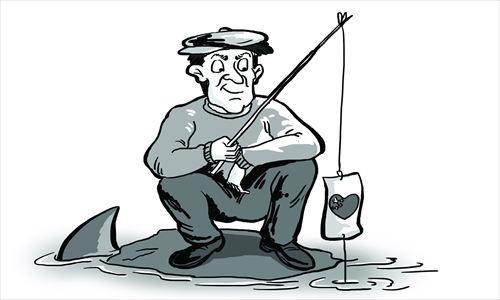Patriotism is not ever to be up for sale

In mid September, traveling in Yunnan Province, I found myself frequently surrounded by stirring discussions over the Diaoyu Islands dispute. In Lijiang, an ancient town more than 2,000 kilometers away from the Diaoyu Islands as the crow flies, talks of the Diaoyu impasse could be heard over cups of tea along the narrow alleys and streams.
Frankly, I didn't expect to hear such discussions in areas stamped with the slogan "time stands still here."
But amid escalating tensions with Japan, it is natural that public concerns have penetrated every corner of society and can be heard in remote border regions.
It was not long that I found business operators had also joined in to express their clear-cut attitudes. Initially it was a natural, passionate form of patriotism. In Dali, another ancient city two hours by train from Lijiang, a downtown supermarket gave out free environmental-friendly bags tagged with big red slogans, saying "The Diaoyu Islands belong to China."
It was a simple declaration, behind which was a hot-blooded entrepreneur voicing and conveying his stand to the public. Nevertheless, elements that made people uncomfortable were soon mingled in, and the real motives behind them seemed dubious.
In Shangri-La, a tranquil city in northwest Yunnan, a big poster hanging outside a local restaurant serving Tibetan food caught the attention of every passerby: "No pigs, dogs or Japanese allowed."
Browsing online, I found more eye-catching slogans hung up by business owners.
In Taimushan town, Fujian Province, a clothing store put up a poster: "15 percent discount for customers yelling 'The Diaoyu Islands belong to China' in our store, and 20 percent off for those yelling 'Japan also belongs to China.'" A store on Taobao, China's largest online retailer, granted coupons worth 100 yuan ($15.86) for those who added "The Diaoyu Islands belong to China" on their order forms, which they were able to use on their next purchase.
Patriotism is being used by some business owners to camouflage marketing and sales ploys.
There is even a strange competition to see who can use the words "The Diaoyu Islands" to draw the most attention. In Huaiyang, Henan Province, a gold jewelry store hung a horizontal banner reading: "The Diaoyu Islands belong to China while Sora Aoi (a Japanese porn movie star) belongs to the world."
This spree of utilizing the Diaoyu Islands as a commercial catchword is shameful.
Patriotism is a profound feeling that should never be aroused through glib commercialism, used to amuse consumers and fatten wallets.
The country remembers a notice announcing "No dogs or Chinese allowed," at the entrance of Huangpu Park in Shanghai in the early 20th century as a racist sign symbolizing a dark era. It is ludicrous that such a despicable notice today has found a copycat in our country today.
It is fortunate that while a few individuals are amused, most Chinese see these slogans and notices as shocking. No one would feel any boost to their patriotism by yelling "The Diaoyu Islands belong to China" or the aberrant "Japan belongs to China," buying a coat and enjoying a discount. And there is no pride in eating in a restaurant that ranks Japanese people with dogs and pigs.
Radical slogans are inevitable in society amid such escalation of territorial disputes.
And it is a demonstration of social calm that these slogans have been heavily rebuked in China. These few businessmen, whose "patriotism" becomes a pragmatic gadget to make money, only worsen their own reputations by doing so.
The author is an opinion editor with the Global Times. chenchenchen@globaltimes.com.cn